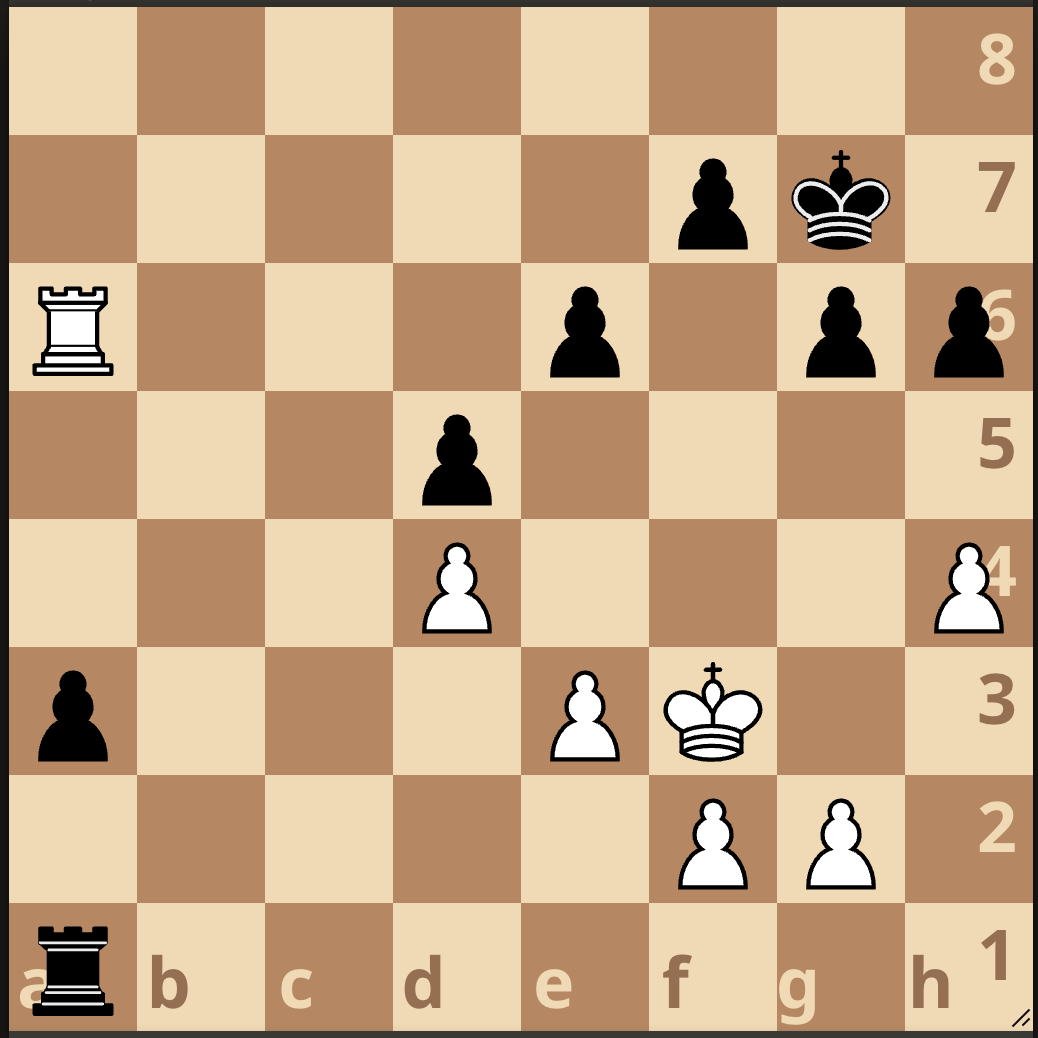In This Issue: From The Skittles Room Endgame Corner, by IM Silas Esben Lund Annotated Game from the New York 1924 Centennial - Part 1, by GM Prithu Gupta Chess Toons En Passant Problems, Problems, curated by Alexander George Editor's Note
Welcome back, fellow chess players, to this edition of the Marshall Chess Club's fortnightly bulletin, The Marshall Spectator.
A special announcement from the Executive Director, Carlos Chavez:
Dear parents of our scholastic and youth players, join us on Tuesday, September 24 from 5pm-9pm for a parent BBQ. We will have food, music, casual blitz, and a good time. ONLY FOR PARENTS AND THEIR SCHOLASTIC/YOUTH MEMBERS.
Over the last two weeks we have had a plethora of events for our members to play in.
The FIDE Rated Monthly Under 2400 that ended on August 18 had 59 players registered and was won by Kiren Nasta, who scored 4.5 out of 5 to win the $950 first place prize. Cameron Goh Jinghan and IM Jay Bonin scored 4 out of 5 to win $309, while Hunter Quirk and Jin Ma won a class prize of $142.50 each for their 3 points, while the following 5 players won $57 for their performance: Derek Zhang, Rohan Lee, Suvan Baranwal, Rocco Degeest, and George Berg.
The FIDE Rated Monthly Under 1800 that ended on August 18 had 33 players registered and was won by Kai Waters and David Gelpi who scored a perfect 4 out of 4 to win $374 each. Kyle Cheng won a class prize of $160 for his 3 out of 4 score. Robert Thorstad, Alvin Lou and Matthew Dinglasan scored 3.5 out of 4 to win $44.67 each, while Marissa Lu, Lucien Jaccon and Chris DeDona scored 3.5 out of 4 to win $53.33 each.
The Sunday Morning Rated Beginner Open on August 18 had 30 players registered and was won by William Rushton, Brendan T Seto, and Anthony Aquino who scored a perfect 3 out of 3 to win $121.
The Saturday Morning Masters on August 17 had 10 players registered and was won by GM Mark Paragua who scored a perfect 3 out of 3 to win $75, while Yuxing J Yang scored 2.5 winning $38. Aakaash Meduri and WFM Abby Marshall scored 2 points to win $6.50 each.
The Saturday Morning Under 2000 Action on August 17 had 24 players registered and was won by David Campbell, who scored a perfect 3 out of 3 to win $150. Davin Chen, John Silva, and Connor Hamilton Galvez scored 2.5 out of 3 to win $20 each, while the following 4 players won $22.50 for their performance: Mattingly Taveras, Travis Henry-Reid, Micahel Shea, and Eugene Bang.
The Friday Rapid on August 16 had 12 players registered and was won by Linxi Zhu, who scored 3.5 out of 4 to win the $60 first place prize. Nathan Peyton finished in nsecond place, winning $30 for his 3 out of 4 score, while the following four players won $15 each for their performance: Gautam Narula, Matthew Biancuzzo, Atharva Washimkar, and Luran He.
The Brother John McManus Action on August 15 had 60 players registered and ended with the following 6 players scoring 3.5 out of 4 to win $98.67 each: IM Yury Lapshun, Aditeya Das, Judah Schizer, Micheal Glick, Jack Yang, and FM Jonathan Subervi, and Misha Raitzin scored 3 out of 4 to win $111.
The Thursday Open that concluded on August 15 had 14 players registered and was won by George Berg, who scored 5 out of 6 to win the $150 first place prize. Jason Zhao took second place, scoring 4.5 out of 6 to win $100. Leo Paas scored 3.5 out of 6, finishing in 3rd and winning $50 for his efforts while the following 4 players won $18.75 for their 3 out of 6 score: Oliver Spohngellert, Rajesh Uppala, Niccolo Dalmasso, and Kara Chan.
The Sunday Rated Beginner Open on August 11 had 25 players registered and was won by Beni Lawson, Brendan T Seto, and Hideki Karas who all scored a perfect 3 out of 3 to win $104.33 each.
The Sunday Game 50 Open on August 11 had 38 players registered and was won by IM Jay Bonin who scored a perfect 4 out of 4 to win $222, while Andrey Pichugov scored 3.5 out of 4 to win $148, and Bryant Chen scored 3 points to win a class prize of $111.
The Sunday Game 50 Under 1600 on August 11 had 33 players registered and was won by Kirill Tsydypov and Zachary Gaw who scored 3.5 out of 4 to win $165 each, while Akaash Rau, Aadi and Noah Zucker won $33 each for their 3 out of 4 score.
The Saturday Game 50 Open on August 10 had 40 players registered and was won by IM Jay Bonin, GM Michael Rohde, Noe Solorio Valderrama and Alexis Paredes who scored 3.5 out of 4 each to win $126.75.
The Saturday Game 50 Under 1800 on August 10 had 38 players registered and was won by Cameron Edward Hull and Dante Mayeno who scored 3.5 out of 4 to win $185 each. Lucas Lin, Marissa Lu, Axel Peters, and Manuel Najera scored 3 points to win $27.50 each.
The Under 2000 Morning Action on August 10 had 20 players registered and was won by Milo Su, who scored a perfect 3 out of 3 to win the $119 first place prize. Russell Kaplan and Travis Henry-Reid won $35.63 for their performance, while the following 5 players won $9.60 each for their 2 out of 3 score: Joseph Otero, Noni Hardaway, Aidan Amin, Eric Liu, and Davin Chen.
The Morning Masters on August 10 had 10 players registered and was won by Jamison Kao and Ian Nicholson who scored 2 out of 3 to win $56.50 each.
The FIDE Blitz on August 9 had a whopping 50 players registered and was won by FM Igor Sorkin and FM Juan Pereya, who scored 7.5 out of 9 to win $183.75 each. Kiren Nasta scored 6.5/9, winning $61.25, and Takki Tanaka won a class prize for the same amount for scoring 6 out of 9. The following 7 players scored 6 points winning $17.50 each: Hursh Mehta, FM Andrey Krasnov, NM Aditeya Das, NM Aakaash Meduri, Glenn Cabasso, Kireet Panuganti, and Nirvaan Bharany.
The Afternoon Game 50 on August 8 had 6 players registered and was won by Kiren Nasta and Hema Vikas who scored 2 out of 2 to win $15 each.
The Brother John McManus Action on August 8 had 62 players registered and was won by Joseph Zeltsan and FM Tanitoluwa Adewumi who scored a perfect 4 out of 4 to win $185 each. Michael Li and Vladimir Bugayev won $55.50 each for their 3.5 out of 4 performance, while Matthew Shirvell and Misha Raitzin won $22 each for their 2.5 out of 4 score. The following six players won $18.50 for their 3 out of 4 score: Mihir Bafna, Miguel Omar Garcia, WFM Chloe Gaw, Owen Qian, Daniel Smith, and Michael Lin.
The FIDE Premier Open that ended on August 4 had 52 players registered and was won by FM Akira Nakada who scored 4.5 out of 5 to win the first place prize of $1,334, while the following 5 players shared in the remaining place prize funds earning $150 each: Bryan Lin, IM Mykola Bortnyk, William Safranek, Haari Muthukumar, and Linxi Zhu. James Marsh and Caleb Klenoff scored 3.5 out of 5 to win class prizes of $208.50 each.
The FIDE Premier Under 2000 that ended on August 4 had 51 players registered and was won by Connor Wang, who scored a perfect 5 out of 5 to win the first place prize of $817. Wang Zimo, Justin Dalhouse, and Winsley Wu scored 4 points, winning $109 each, while Sam Sharf and Robert Thorstad scored 3.5 out of 5 to win class prizes of $122.50 each.
The Rated Beginner Open on August 4 had 33 players registered and was won by Damien Burke, Matthew Ghilieri, and Abilseit Marat who scored a perfect 3 out of 3 to win $137.67.
The Morning Masters on August 3 had 9 players registered and was won by NM Jessica Hyatt, who scored a perfect 3 out of 3 to win $68, while Chase Knowles scored 2 out of 3 to win $34.
The Under 2000 Morning Action on August 3 had 37 players registered and was won by Joseph Otero, Aidan Amin, and Jack Boyer-Olson who scored 3 out of 3 to win $108 each. Jonathan Hsieh won a $139 prize for his 2.5 out of 3 score.
The Afternoon Game 50 On August 1 had 6 players registered and was won by Alvin Lou, who scored 2 out of 2 to win the $15 first place prize.
The Brother John McManus Action on August 1 had 54 players registered and was won by Thomas Knoff and Justin Dalhouse who scored a perfect 4 out of 4 to win $156.50 each. The following 10 players won $18.80 each for their 3 out of 4 score: Hursh Mehta, Vladimir Bugayev, Mitchell Stern, Andrey Pichugov, GM Michael Rohde, NM Anthony Levin, Owen Qian, Alec Hyunmook Choi, Miguel Garcia, and Wyatt Wong.
We look forward to seeing you at the club soon!
Endgame Corner, by IM Silas Esben Lund
This column is again with rook endgames, with an equal amount of pawns on the kingside, where the attacker has an extra a-pawn on the queenside. Furthermore, we consider positions where the rook of the attacker is in front of the a-pawn, which is considered the worst placement in these cases. White's defending rook is located behind the a-pawn. Start by answering the question to the following diagram. The answer, and explanations, will follow thereafter. Should Black play 53... a2 in this position? The dilemma in these positions is often that with the pawn on a2, the black king has nowhere to hide in front of the pawn if it decides to support the pawn later (via, say, b3). If Black on the other hand keeps the pawn on a3 - to be able to hide the king on a2 - pawn promotion is not an imminent threat, and the white rook therefore has time to pick up some pawns on the kingside before returning and sacrificing itself on the a-pawn. The picked up pawns on the kingside will then assist white in the counter-play on the kingside and prepare him for the final rook vs pawn(s) race.
You can play through these positions with annotations here.
Gromek, Jozef vs. Milev, Zdravko Moscow, 1956
53... a2 The answer is YES! Because of 5 pawns each on the kingside, Black will be able to create a second weakness of importance. The winning idea is f6+e5 that will create a weakness on d4 or give Black a passed pawn on the d-file (if White captures on e5). The game continuation shows the winning idea well.
54. Ra5 (An important sideline is if White tries to stop f6+e5: 54. Kg3 f6 55. f4 However, now there is an additional target on e3, and if this pawn drops, both d4 and f4 will be weak. In this case, Black can transform the position and give up a2 to win e3 at the right moment. Kf7 56. Ra7+ Ke8 57. Kf2 Kd8 58. Kg3 Kc8 59. Kf2 Kb8 60. Ra3 Kb7 The black king is advancing on the queenside. 61. Kg3 Kb6 62. Kf2 Kb5 63. Ra8 Kb4 64. Rb8+ Kc4 65. Rc8+ Kd3 66. Ra8 Ke4 67. Ra6 Kf5 68. Kg3 h5 69. Ra7 Re1 70. Rxa2 Rxe3+ 71. Kf2 Rd3 (71... Kxf4) 72. g3 Rxd4 Black is simply two pawns up.)
54... f6 55. Ra7+ Kf8 56. Ra8+ Ke7 57. Ra7+ Kd6 58. Ra6+ Kc7 59. Kf4 Kb7 60. Ra3 Kb6 Again, the black king is advancing on the queenside.
61. Ra8 Kb5 62. g4 g5+ 63. hxg5 hxg5+ 64. Kf3 e5 The decisive break that will create a second weakness.
65. dxe5 (65. Ke2 exd4 66. exd4 Kc4 67. Kf3 (67. Ra4+ Kb3 68. Ra6 Rb1 and the a-pawn promotes.) 67... Kxd4)
65... fxe5 66. Ke2 d4
White resigns as the d-pawn will disrupt his defense, for instance: 67. exd4 exd4 68. Ra7 d3+ 69. Kd2 (69. Kxd3 Rd1+ 70. Kc2 a1=Q 71. Rxa1 Rxa1) 69... Rf1 70. Rxa2 Rxf2+ 71. Kxd3 Rxa2 0-1
Our position without pawns on d4/d5.
Black has winning chances. However, if he plays the immediate 53... a2 White is quite safe as Black is unable to create an additional weakness of importance on the kingside. White can, among many other moves, play 54. g4
Our position without pawns on d4/d5 and e3/e6. Black still has winning chances, but White should be able to make a draw. This verdict stands no matter if Black plays 53... a2 or not. With 3 pawns each on the kingside, it is simply hard to create a second weakness of importance. Positions like this with 3 pawns each on the kingside will be the subject of the next Endgame Corner.
IM Silas Esben Lund, Marshall Spectator Contributor
Annotated game from the New York 1924 Centennial - Part 1, by GM Prithu Gupta
It was the second day of the Centennial in the iconic Marshall Chess Club, when I first saw two passionate young guns battling it out on board 16. It just so happened to be the board which the Carlsen-Karjakin WC Match was played on in 2016. I was swift to go check the pairings to see who these youngsters resembling the skills and energy of the young versions of the giants whose legacy they were carrying forward, were. That is when I saw that one of them was not only a passionate young kid, but already an accomplished IM. At the age of 14!
GM Khamrakulov, Djurabek vs. IM Chen, Ryo New York 1924 Centennial You can play through the game with annotations here.
1. e4 c5 2. c3 possibly aimed at taking the prodigy out of his preparation quicker than he would have in the ever theoretically dense lines of 2.f3.
2…d5 (2... Nf6 3. e5 Nd5 4. d4 the other main line.) 3. exd5 Qxd5 4. d4 g6 5. Nf3 Bg7 6. Nbd2 the top choice of the engine and also bears an exclamation mark on the reference database. (6. Na3 cxd4 7. Bc4 Qe4+ 8. Be3 Nh6 (8... dxe3 9. Bxf7+ Kf8 10. Qd8+ Kxf7 11. Ng5+) 9. cxd4 O-O 10. O-O Bg4 was how most of the games starting with 6.a3- the main move on move 6, were played.)
6... cxd4 7. Bc4 Qc5 (7... Qd8 8. Nxd4 Nf6 (8... Bxd4 Greed for the venomous pawn must be avoided at all costs. A sample line would have been as follows. 9. cxd4 Qxd4 10. O-O Nc6 11. Qb3 Ne5 12. Re1 Nf6 13. Rxe5 Qxe5 14. Bxf7+ Kf8 15. Nf3 Rf8] Qh5 16. Bf4 Kg7 17. Qb4 Kxf7 18. Ng5+ despite black's overwhelming material majority, white's piece activation and harmony prevail. 9. O-O O-O 10. N2f3 Qc7 11. Qe2 Bg4 12. h3 Bxf3 13. Nxf3 Nc6 14. Re1 =)
8. Nxd4 (8. Qb3 Nh6 (8... e6 9. Ne4 Qc7 10. Nxd4 Qe5 11. Bb5+ Nd7 12. Bxd7+ Bxd7 13. Qxb7 Rb8 14. f4) 9. Ne4 Qb6 10. Nxd4 ) 8... Nf6 9. O-O O-O
Now the game seems very even. Maybe just the kind of position an experienced grandmaster would want against a youngster. But at the same time, due to the large number of pieces on the board, there's never ending potential for tactical warfare to break loose at any given point in time! Something that the Ryo Chens of the world (a reference to all young prodigies like himself) would grab with both hands wide open, if given an opportunity to!
10. Re1 e5 that's the energy I was talking about! (10... a6 11. Qe2 b5 12. Bb3 Nc6 13. Nxc6 Qxc6 can't take the pawn on e7 due to e8 and despite the 0.00 engine evaluation, if there's any side I would pick to play with, it'd be Black.)
11. b4 Qc7 12. Nb5 Qb6 (12... Qc6 13. Rxe5 a6 14. Rc5 (14. Nd4 Qc7 15. Rc5 Nc6 16. Nxc6 b6 nearly impossible for humans to sight, but also worthy of making it the game of the century if found over the board and won) 14... Qd7 15. Nc7 b6 16. Nxa8 bxc5 17. Nb6 Qc7 18. Nxc8 cxb4 19. Bb2 Rxc8 20. cxb4 Rd8 21. Qc2 Ng4 22. g3 Bxb2 23. Qxb2 Qe5 a crazy line suggested by the computer that'd most likely end in peace.)
13. Nf3 Black's queen is now just misplaced. 13…Ng4 14. Qe2 (14. Be3 Nxe3 15. Rxe3 Nc6 (15... Bh6 16. Rd3 e4 17. Rd6 Nc6 18. Ne5 Bf4 19. Nxg6) 16. Nd6)
14... a6 Ryo doesn't miss a single shot at redemption! 15. Na3 e4 Ryo- the destroyer of worlds! 16. Nd4 Nc6 17. Nac2 Qc7 18. g3 Nce5
After just one mistake by GM Djurabek and a series of one good move after another by his opponent, the tables had fully turned by this point. 19. Na3 Nd3 (19... b5 20. Bd5 Nd3 21. Rd1 (21. Bxa8 Qxc3 22. Bd2 Qxd4 23. Rf1 Bf5) 21... Qxc3)
20. Bxd3 Qxc3 21. Bb2 Qxd3 22. Qxe4 Qd2 23. Qe2 Qxb4 24. Nb3 Be6 (24... Bf5 would have subdued the effectiveness of c2. 25. Bxg7 Kxg7 26. Nc2 Bxc2 27. Qxc2 Rac8 28. Qb2+ Nf6 29. Re3 Rfd8 30. Rae1 Rd5 31. Re7 Rc3 White simply doesn't have enough compensation for the pawn.)
25. Nc2 Qc4 26. Bxg7 Qxe2 27. Rxe2 Kxg7 28. Nc5 Bd5 29. Rd2 Bc6 30. Nd4 Ne5 31. Re1 Rfe8 (31... Nf3+ 32. Nxf3 Bxf3 33. Re3 Bc6 a better alternative.)
32. Nce6+ fxe6 33. Rxe5 Rad8 (33... Bd5) 34. Ree2 Kf6 35. Nxc6 Rxd2 36. Rxd2 bxc6 even though a pawn up, due to all his weaknesses, it'd be tough for Black to convert, especially if the opponent were to show precession in defending.
37. Kf1 Rb8 38. Rc2 (38. Rd7 Rb2 (38... h5 39. Ra7 Rb6 40. a4 c5 41. Rc7 Rb4 42. Rxc5 Rxa4 43. h4 this should hold. Ra1+ 44. Kg2 a5 45. Kf3 a4 46. Ra5 a3 47. Kf4 a2 48. Kf3 e5 49. Kg2 Kf5 50. Ra4 e4 51. Ra5+ Ke6 52. Ra7 Kd5 53. Ra6 Kd4 54. Ra7 even something like this doesn't yield Black anything more than a disappointing draw.) 39. Rxh7 Rxa2 40. Rc7 Rc2 41. Ra7)
38... Rb6
Now due to a the simple error of placing his rook at a passive place, White has enabled Black to be in the driver's seat again.
39. Ke2 Ke5 40. Kd3 Kd5 41. Kc3 (41. Rd2 prevents the penetration with b1 in view of c2.) 41... Rb1 42. Rd2+ Kc5 43. Re2 Rc1+ 44. Kb2 Rd1 45. f4 Kd6 Not only his sense of tactics and calculations, but Ryo's endgame technique is impeccable too- something very atypical of youngsters his age.
46. Kc2 Rd5 47. Kc3 g5 48. fxg5 Rxg5 49. Re4 Rc5+ 50. Kd3 Ra5 51. a4 Rh5 52. h4 Rd5+ 53. Kc3 Rc5+ (53... h5 54. Rf4 Rf5 55. Rd4+ Kc5 56. Rc4+ Kd5 57. Rd4+ Ke5) 54. Kd3 Rf5 55. Rg4 h5 Some inaccuracies due to time pressure I believe. 56. Rg8 Ra5 57. g4
The decisive mistake. (57. Rd8+ Kc7 58. Re8 Kd7 59. Rh8)
57... Rxa4 58. gxh5 Rxh4 59. Rh8 a5 60. h6 a4 61. h7 Kc5 a not so subtle error. (61... Rh3+ 62. Kc2 Ke5 63. Rc8 Rxh7) 62. Kc3 Rh2 (62... e5 63. Re8) 63. Re8 Rxh7 64. Rxe6 Rh2 65. Re5+ Kd6 66. Ra5 a3 67. Kb4 a2 68. Kc4 Re2 69. Ra7 (69. Kb3) 69... Ke5 the young tactical genius finds the only move that wins.
70. Kd3 Rf2 could have proven fatal in his attempt to win again. 71. Ra5+ loses on the spot. (71. Ke3 Rg2 72. Ra5+)
71... Kf4 72. Kc4 Rd2 73. Ra3 Ke4 74. Ra6 Rc2+ 75. Kb3 Kd3 76. Ra8 c5 after an ever tense battle that must have been the last to end among all games of the round, the tenacious youngster managed to outwit his much elder and statistically stronger opponent, capitalizing on most mistakes the latter made, including the decisive one- that's the 14 year old IM Ryo Chen for you ladies and gentlemen! 0-1
GM Prithu Gupta, Marshall Spectator Contributor
Chess Toons
En Passant
Alireza Firouzja emerged as the winner of the 2024 Saint Louis Rapid & Blitz. After tying for first place in rapid with Ian Nepomniachtchi and Maxime Vachier-Lagrave, the Iran-born Frenchman delivered an excellent performance in the double round-robin blitz to score 23/36 (11/18 in rapid and 12/18 in blitz) and clinch the title with two rounds to spare.
The $350,000 Sinquefield Cup at St Louis, one of the top three global tournaments, starts today with one name conspicuously absent. Magnus Carlsen, the world No 1, is staying away again, and has not competed in America’s chess capital since the day in 2022 when he lost in the third round to 19-year-old Hans Niemann.
Hans Niemann closes on world top 20 as US star impresses in London.
Continuing with the "Hans Niemann against the World" series, Niemann and Etienne Bacrot began their 5-day match on Tuesday. The first 2 classical games were played at the Blitz Society Bar, with Niemann first holding Bacrot to a 37-move draw with black and then beating the Frenchman while marshalling the white pieces.
On July 1, FIDE announced that Singapore would host the $2.5 million Ding vs. Gukesh match, while today, they announced the exact venue of the event that runs November 20-December 15.
Problems, Problems, curated by Alexander George
J. Vancura, 1922
White to move and win
Another Vancura! All the winning White moves are forced!
Many of you will know of the famous Vancura draw in rook endgames. If you don't, you can learn it here. For some further background on Vancura and his draw, see this historical note, where we learn that Vancura was dead before his famous endgame contribution was published: he died at the age of 23.
---
Last issue’s puzzle, J. Vancura, 1922
White to move and win.
Solution to last week’s puzzle: Vancura, 1922: 1.Bc5! Bh7 (1...Bf7 2.Bh7 Rd8 3.Be7) 2.Bf7 Rd8 3.Be7.
---
Alexander George
Editor's Note
As always, if you have any feedback, comments, or would like to submit an article please contact us directly at td@marshallchessclub.org.
Enjoy, and thanks for reading!
The Marshall Chess Club
23 West Tenth Street New York, NY 10011
212.477.3716
Thanks for reading The Marshall Spectator! Subscribe for free to receive new posts and support the club.





















Great endgame article by Lund. I learn so much for Lund and Alex King. Keep up the good work.